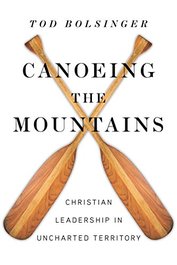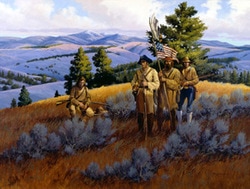 Tod Bolsinger, a popular Christian writer, wrote a book in 2015 entitled Canoeing the Mountains: Christian Leadership in Uncharted Territory. The book makes a wonderful analogy of Meriwether Lewis' and William Clark’s leadership of the Corps of Discovery into the uncharted territory of the Louisiana Purchase and what church leadership is like today. After Lewis and Clark traveled the length of the Missouri River and made their way up the east side of the Continental Divide, they expected to immediately find a river heading west to the Pacific Ocean. What they found, instead, was the Northern Rockies that extend for over a hundred miles with multiple, barely passable ranges from what is now western Montana all the way to eastern Washington. Bolsinger writes, "What Lewis actually discovered was that three hundred years of experts had all been completely and utterly wrong. In front of him was not a gentle slope down to a navigable river running to the Pacific Ocean but the Rocky Mountains." [i] From that moment on, every step they took forward was a step into the unknown. For hundreds of years, all sorts of experts had convinced themselves that there simply must have been a Northwest Passage. Steeped in this knowledge and speculation, Lewis and Clark and their Corps of Discovery had traveled the expansive length of the Missouri River, farther into the newly purchased American west than any European or American had ever gone before. Yet, "As he stepped off the map into uncharted territory, Meriwether Lewis discovered that what was in front of him was nothing like what was behind him, and that what had brought him to this point in the journey would take him no farther… How do you canoe the mountains? You don’t. If you want to continue forward, you change. You adapt." [ii]  What a great analogy for the church in our time! Everything that worked before is being called into question. As a church, we are like the Corps of Discovery gazing on the mountains in front of us, knowing only that we did not expect to find this present reality. In the past, the church operated like we had a clear path to our future destinations, assuming that when we climbed one mountain, we would not have to climb another because it would be smooth sailing to the seas beyond. And yet, now we find ourselves looking out on an unknown future, hoping that we have enough people, youth, faith, pastors, money, interest, etc., to make it past the mountains that have very clearly risen up in front of our eyes. What is the solution that Bolsinger gives to the problem of encountering mountains when we expected to be able to paddle with the current? Be like Lewis and Clark. Be adaptable. Be willing and able to change. Surround yourself with good capable people and resources to be prepared for what is headed our way. Be able to head into uncharted, mountainous terrain (i.e. thin church budgets, declining membership, lack of youth, aging communities, etc.) and adapt along the way, just like Lewis and Clark did. This is a very compelling analysis and analogy of the challenges that churches face today, but I, as a pastor, am left with one very daunting question – you expect me to be Lewis and Clark!? Lewis and Clark were arguably the greatest explorers America has ever known! What they did was incredible! Others had planned for such an expedition but for various reasons came up short. Yet, Lewis and Clark proved that they had superior leadership abilities as they traveled across uncharted lands and waterways. It is hard to compare oneself to leaders such as this! They negotiated with foreign nations and leaders, overcame sickness and injuries, bartered for horses and other gifts, kept a crew of highly capable riflemen from shooting each other over three stressful years, and even survived a gunshot wound! Lewis and Clark were not ordinary leaders – they were extraordinary in most every sense of the word. You really think most American pastors and church leaders can match the standards of leadership set by Lewis and Clark? Maybe, but I am not holding my breath. It is quite a tall order to expect pastors to reach the level of adaptability and capability shown by these two adventuring legends. I have met many pastors who complain about how inflexible their congregations are, but when we discuss changing things in our church structure, they become just as unflinching as they accuse their lay members of being. Other pastors seem very willing to change things in the church - whether it be names on the building, staff in the offices, or ministry programs and initiatives - but often are not very capable of following through and implementing these changes well. It seems a rarity that clergy are both capable and adaptable, and an even greater rarity that we will willingly venture into the unknown. We usually have to be forced in one way or another to tackle problems and issues that are not in our comfort zones and we feel are beyond our abilities to handle. Furthermore, Lewis and Clark were able to pick their people from a pool of thousands of would be adventurers who did not end up on their journey![iii] Unlike the Corps of Discovery, we do not get to choose who comes to church and who is denied entry. Even though I know a ton of pastors who would like to take down their “All are welcome!” signs and hold auditions for who can earn their place in the pews, we don’t operate that way. Lewis and Clark were able to choose the best of the best from thousands of soldiers, trappers, and other adventurers for their mission to the coast. Their leadership was enhanced by the high quality of individuals that they were able to lead. Surely there are many capable people in our churches, but there are also a lot of folks who come to church because they are broken and in need of wholeness. Just as it is not fair to expect our pastors to be leaders on par with Lewis and Clark, it is unfair to expect our lay members to be able to hack it in the Corps of Discovery either. Lewis and Clark could expect a lot more from their men than from others because they chose men who were more capable than most. If Canoeing the Mountains provides a helpful analogy to the problems the church is facing but places extraordinarily high expectations on church leaders and members, then how do we think about facing the unknown together? I hope that we can all be aware of the enormity of the challenges we face these days. It is not easy to be a pastor, nor is it easy to be a church member anymore. The challenges we face are in many ways as daunting as those that the Corps of Discovery faced when they gazed on the expansive northern Rockies for the first time. Yet, recognizing the difficulty of crossing mountains when most of us expected to paddle with the current can help us to be gracious with one another. Though we face challenges of explorers, we pastors are not Lewis and Clark. Many of us are not likely to become legendary leaders. While we face legendary challenges, many of us will likely come up short of leaders who faced such odds before and came out on top. As Christians, we should show grace when our leaders do not prove to be extraordinary at dealing with extraordinary challenges. More than that, just as I hope that grace should be shown to pastors, I also hope that pastors will be gracious with their congregations. It is not easy to lead in these times – nor is it easy to follow when it means crossing into uncharted territory. We must be patient with our members. We should not expect our members to give beyond their means, have more time and energy to participate in church activities than they actually do, or be as adaptable and capable as we think these times demand. Most of us are not Lewis and Clark. Nor are we members of the amazing Corps of Discovery that followed them into the unknown and back. As a church, we are facing great unknowns of mountainous terrain. I hope, pray, and believe that God will lead us through these times when challenges seem to surround us on all sides. Yet, I also hope that as the church makes the difficult journey into the future, we show grace to one another along the way. We should not blame our pastors’ inability to adapt or point fingers at other church members who fail to step up like we think they should when tough times get even tougher. Sometimes, what seems impossible ends up just being impossible. Instead of blaming the person next to us, it is better to accept that we are not all Lewis and Clark, nor can all of us make it through the mountains. The good news is that this is God’s church. God does not need us to make it through the mountains of our time in order to preserve this holy institution. The church has gathered in the catacombs of Rome, mountainous fortress monasteries in Greece, under trees in deserts of Namibia, on ships sailing the oceans, and many more places that we would never expect. The church has crossed oceans, soared in the skies, settled new lands, been displaced from old ones, and even scaled mountains. The church has survived countless wars, famines, droughts, and diseases. God has preserved the church through many trials in the past, and we can trust that God will not abandon the church in the future. [i] Bolsinger, Tod. Canoeing the Mountains: Christian Leadership in Uncharted Territory. IVP Books, 2015, p. 26. [ii] Tod Bolsinger, Canoeing the Mountains: Christian Leadership in Uncharted Territory (IVP Books, 2015) 34. [iii] Stephen E. Ambrose, Undaunted Courage: Meriwether Lewis, Thomas Jefferson and the Opening of the American West: Meriwether Lewis Thomas Jefferson and the Opening, 1st edition (Simon & Schuster, 2013).
0 Comments
Your comment will be posted after it is approved.
Leave a Reply. |
AuthorRev. Seth Nelson, author of The Church Unknown: Reflections of a Millennial Pastor, writes this blog. The blog focuses on the future of the church as well as how God loves and cares for us in the present. He is a pastor in Ronan, Montana. Categories
All
Archives
January 2023
|

 RSS Feed
RSS Feed
